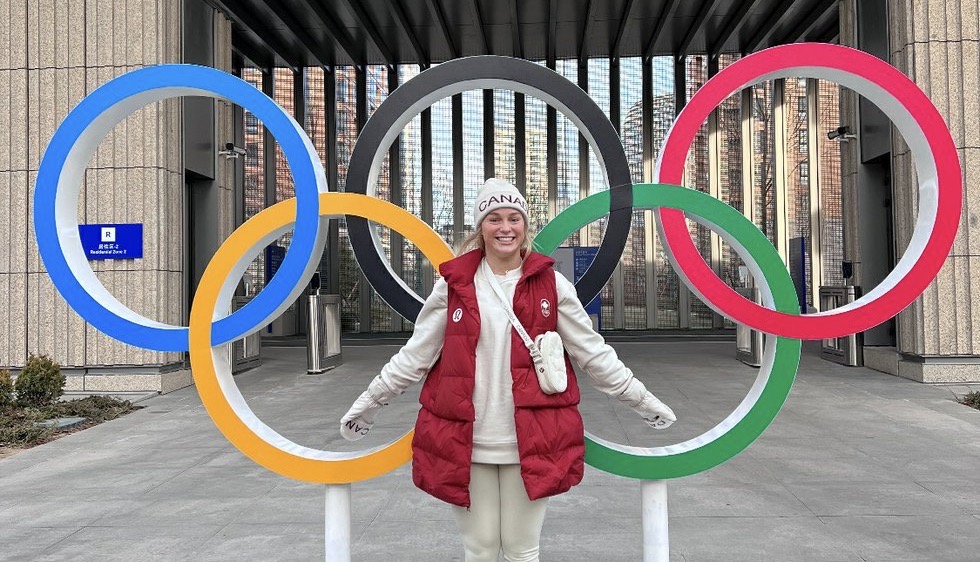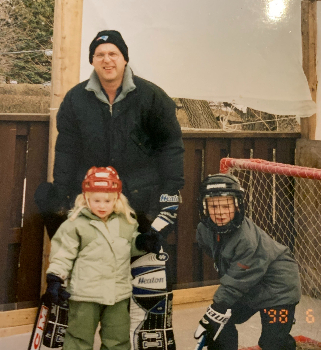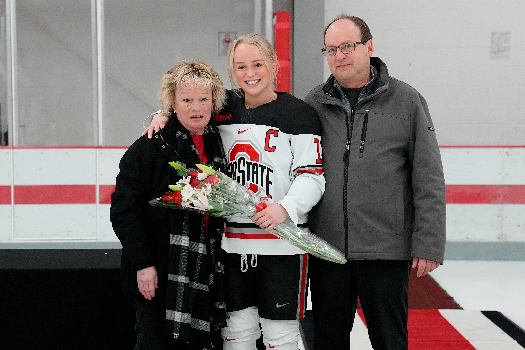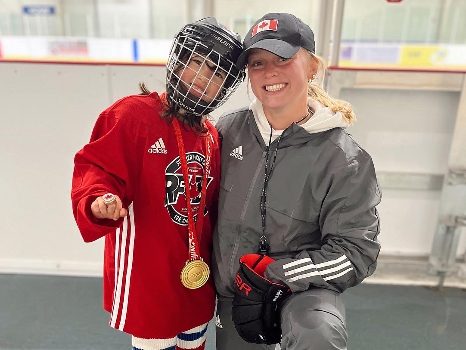
Oakville Hornets alumna Maltais proffers, “If you’re relying on your parents or mentors to push you toward your goals, something is lacking between talent and passion, and I think that if you have both of them, you have a great recipe to succeed with.
In this interview with Olympic Gold Medalist Emma Maltais, she shares her experience as an elite hockey player and offers advice for young aspiring athletes.
As a two-time U18 WJC Silver Medalist, 2022 Olympic Gold Medalist, and a two-time World Championship Gold Medalist, many might already be familiar with 23-year-old Halton girl Emma Maltais’ staggering career highlights.
We celebrate her successes along with her and her teammates’, but Emma makes certain to remain grounded by remembering and reminding others close to her that it took another kind of team to achieve what she has accomplished so far.
Q. At what age did you strap on skates?
EM: I started skating when I was two to three on my outside rink with my dad. I was in gymnastics initially and got cut in tryouts. I remember my dad signing me up right away for hockey just before the gymnastics coach changed her mind. I sometimes laugh about it. I can't imagine how different my path would have been or a life without hockey.

When I stepped on the ice, I knew that I loved skating. Figure skating or any other ice skating wasn’t an option for me. Watching my brother play when I was young; my dad loving it; my mom loving it, and knowing that my mom and dad met while watching a hockey game, made the transition to hockey seem like a natural choice.
Q. When was the decision made to take your hockey experience to the next level?
EM: I started playing organized hockey right away with the Burlington Barracudas. I loved it growing up. I even played in the boys league, with the Burlington Eagles. I was the only girl in the club. It wasn’t until I transitioned back to girl’s hockey that I saw what the opportunities were for girls. What came next seemed to happen really fast.
Grade 8 was when I began receiving interest from the NCAA schools. That was when I knew what I would be pursuing. When I turned 15 I got the first call to go to U18 Hockey Canada Camp.
Q. What motivated you to continue on through less successful seasons, team politics, or exposure to negative influences along the way?
EM: For instance, when I was playing boy’s hockey and being the only girl, the heat was felt more by my parents. I was pretty innocent playing the sport that I loved to play. My parents protected me from politics so that I could just enjoy the game.
When you’re two years old, and into your teens, you’re playing the sport because that's what you do to stay active and to see your friends. I was just like any normal kid who wanted to do that.
Q. How important is a mentor?
EM: If you keep the people who support you closest, you’ll be successful. I still talk to my high school hockey coach and trainer that I had growing up. Those are wholesome relationships.
When they’ve done so much for me growing up, I think staying in contact with them and feeling that support and remembering that I’m not the only reason why I got here is essential. All those people are why I am where I am. It’s important for me and for me to remind them that I know that. That helps to keep me motivated. It takes a team of support, and I’m part of a bigger bubble.
When I was in the eighth grade, Bradi Cochrane called me up to play at the next level on her team, the Oakville Hornets, shortly thereafter transitioning as a team member. She’s just an amazing person and coach. Bradi taught me how to think in the game.
She’s the one who told me that she thought that I was one of the top players at that time. You don't really know that until someone, who is in a position to help you, lets you know that there can be a career in the sport that you love. A mentor is someone who invests time and support in you. Without them, you're just playing for your city, oblivious to the opportunities.
Before I went to my first hockey camp, Bradi really gave me that confidence in what I needed to do, how I needed to be me and to play how I play, always instilling that confidence of what made me different from the other players.
How to think of hockey as a mind game at a young age is what really set me apart heading into university. I learned a lot from her.
Q. What is your ideal recipe for success?
EM: First of all, I’m there playing that sport because I’m having fun and that is where I want to be.
I wasn’t aware of what my potential was when I started playing. There are those thinking from the beginning that they’re great and that they’re going to make it happen. I think that they are missing out on something.
It’s safe to have goals. I didn’t know what was possible until my teens. If you put your head down and push toward your own goal, it's good, but if you’re relying on your parents or mentors to push you toward your goal, something is lacking between talent and passion. You can’t teach passion. I think that if you have both of them, you get a great recipe.
Q. How do you prepare yourself for the demands of the sport?
EM: I am very much into health and wellness and have been since I was young. I grew up with a mother who embraced exercise as a lifestyle, and seeing her love that and seeing how it changed her outlook every day made me want that.
From a young age being active, and finding a sport that I loved to play helped me to naturally embrace a more well-rounded lifestyle, wanting to be in the gym when I was older.
Exercise allowed me to be as strong and as fast as I could be. Having such a small frame, that was very important for my development. Being committed to that outside of hockey was really, really important for me.
Q. How do you answer the perception that it’s those people who have means and influence who get the opportunities?
EM: Hockey is an expensive sport. Training can be expensive as well, and I'm not going to say that my parents didn’t sacrifice a lot for me to be able to play and to have the best training. However, I think that the political side is real, but I also think that if you work hard enough that you will get the opportunities.
Even if it doesn’t happen right away, as long as every little kid knows that if you work hard, you’ll get noticed. There's bound to be a good person above you who will pick you and give you the chance. I’m lucky that it happened for me. Obviously, every kid is not as lucky, but it's bound to happen, even if it's not in hockey.

Q. How do you balance being an elite athlete and being good academically?
EM: I have always loved being busy. From a very young age, I've loved the grind of having a routine. Getting up, going to school, and going to practice. The balance of it is mostly between life and those things. I knew what I had to get done in the classroom and what I had to get done at hockey.
For me, I was also fortunate that I went to an institution that was very supportive in terms of athletics and academics, when I had to travel for tournaments and games.
Q. When did you learn how important it is to have a healthy approach to sport, with a balance of downtime?
EM: In high school, we all want to be cool. When I finally got it in my brain that I am different in terms of what my life was going to be like, I was finally okay if I wasn't going to make it to the party. It was okay if I missed something. In some cases, I discovered that it was really cool to be an elite athlete at a young age.
It's different for everyone when they figure out what is really important and where your priorities are. Making sure I mentally recover and mentally recharge, I really learned in university. I figured out how I needed to stay home sometimes to get homework done and sometimes I needed to just hang out with friends.
Q. What does a typical routine look like before hitting the ice?
EM: I’m not superstitious at all. I visualize right before the game and have fun with teammates.
Q. With reference to women’s hockey, specifically, what advances or progress can we expect to see in the near future?
EM: I interned this past summer with Voice in Sport. It’s a platform that brings young girls together ages 13 to 23 with mentors. I learned a lot about how to help build young girls' confidence, how to mentor them, and how to be part of their support network. It’s important for young girls to be educated in what they can achieve professionally.

A league is being created. The Professional Women’s Hockey Player’s Association is set to launch a second North American professional women’s hockey league. That league is coming, and I think that it's important to know that, be ready for that and to get excited about that. It's a moment of history for hockey that's coming.
Q. Is there a lot available by way of sponsorships, grants, support, promotion, and scholarships?
EM: When I was trying out for Team Canada, I was doing it for fun. I didn’t realize how much others fought for that opportunity. I just felt so fortunate to be there and to receive some compensation.
I think that mindset that we have as young women is that we’re okay with bare minimum for the opportunity. I really learned to acknowledge not only how amazing the opportunity is but where we should really be. That's what a lot of female athletes are fighting for right now.
Yes, we’ve moved forward a lot, but the disparities are still there. When you become professional you rely on donors, investors and we’re working tirelessly to get on an even playing field. It's important to fight for it because I believe it's a legacy we’re all going to leave one day as other young girls grow up in women’s sports.
In the new league with Hockey Canada, there is a board that acquires funding. For me personally, I'm just trying my best to spread awareness and get the movement going in girls’ brains. It took firsthand experience for me to really realize how important it is and I want young girls to realize it at a younger age, to become passionate earlier.
Q. What funding changes are essential in women’s hockey?
EM: Having a stable income from sports and being totally okay with playing sports, and not just for those at the highest level. For a lot of the national team players, their job is hockey, but there are a lot of other girls right now who are not on the national team and dedicating their lives to hockey who are not getting the funding that they need to live their everyday life. I think that this is a change that is going to happen soon. That's what I would like to see.
I’d also love to see women’s hockey televised more and showcased on networks like, ESPN and TSN regularly so that young girls can see it. I think that people want to watch women’s hockey and women’s sports in general. It's really a matter of getting it out there and getting some noise around it.
Q. What other ways will you get involved?
EM: Along with being a player, there is a responsibility to becoming an advocate and a voice. I think that my work with Voice in Sports jumpstarted that for me; continuing on with them and being a mentor for them. Being involved in my own community, it’s really important to make those connections with young kids. I ran a camp this past summer with Renata Fast. Making sure to be around and being available to be a role model is really important. That's part of my vision. Guest-speaking is a short term goal.
Q. What words of encouragement do you have for young athletes?
EM: Keep working hard and get your parents thinking about opportunities to watch female sports by turning on a Professional Women’s Hockey Player’s Association game and Premier Hockey Federation games, to really generate some dreaming and knowing what could be next.
Q. Achievements that you're most proud of?
After being part of a team representing Canada in the Olympics, I’m most proud of my choices in my career. Choosing Ohio State. It took a lot of guts to choose a program, in bioethics, that wasn’t popular. It turned out to be the best choice that I've ever made. I’m really proud of that. I’m really proud of my parents for supporting it.
Q. What’s next for you?
Right now I’m concentrating on the playoffs, and completing my Masters. It’s a waiting game in terms of what's next for hockey. So I’m focused on staying in shape, enjoying the last few months in university, and being ready for any opportunity that arises.